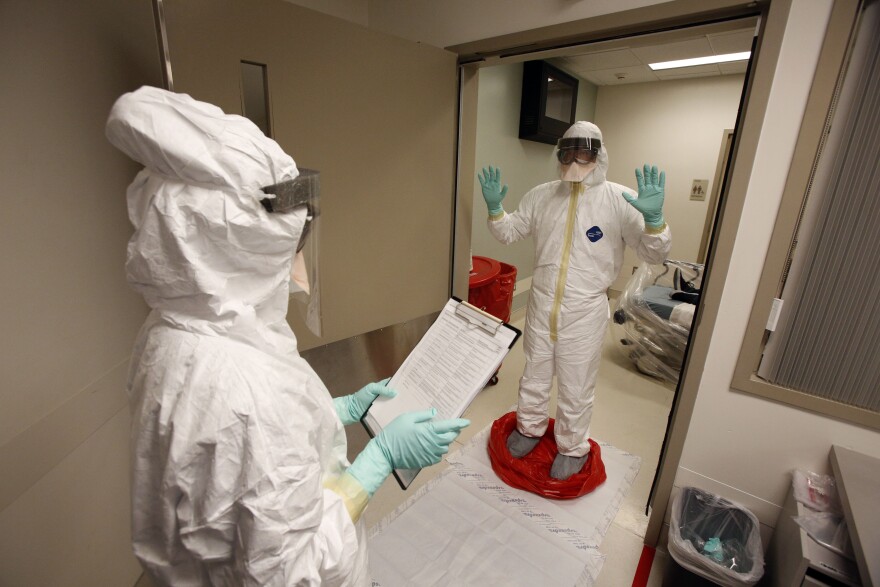As the federal government reevaluates its approach to containing the Ebola virus, official discussion about whether Michigan is ready to handle a case has picked up.
Last week Governor Rick Snyder said he’s “confident” Michigan hospitals are “ready to effectively respond” to an outbreak. But a union that represents nurses says it’s hearing a different story from health care workers in the state.
In Kalamazoo County, government and hospital officials say they’re ready. But not all of their plans have been made public.
Kalamazoo County Emergency Response Coordinator Jeannie Byrne says local authorities are “absolutely” prepared to respond to a case of Ebola. Infectious disease is nothing new for the health department or local hospitals, she says, even if they’ve never dealt with an outbreak of Ebola.
“I am pleased to live in Kalamazoo County because I know our hospitals have good plans in place,” she says.
“They exercise on those plans and they ensure that their staff has the most up to date trainings and knowledge to be able to respond to any infectious disease that should walk through their door.”
Byrne says in Michigan, local governments follow state protocols for dealing with infectious disease. The state updates those plans yearly – or more often if necessary.
“So if something we, some type of protocol we’ve gone along with forever and ever and ever and that changes, the state of Michigan ensures that gets out ASAP and there is a huge expectation that it – it ends up in your plan,” she says.
But not all of the details are publicly available. Byrne says the state keeps those plans secret – at least in part – to avoid their misuse.
“They’re not necessarily public documents. And there’s security issues and other things that would not make them eligible for just everybody to pick up and read see how the State of Michigan is going to respond or what types of things they’re looking for and looking at,” she says.
Not everyone has confidence in the state’s overall preparedness. Last week Michigan Nurses Association criticized Governor Snyder’s approach as “laissez-faire.” It says a survey of health care workers around the state had disconcerting results. Four out of five respondents said their employers had not contacted them about how to handle a case of Ebola. The survey also asked them about protective gear.
“We understand about 60 percent do not have hazmat suits,” says MNA President John Armelagos.
“A simple surgical gown will not do. Air-purifying respirators are required for caring for Ebola patients. A simple surgical mask will not do, it will not provide the necessary protection,” he says.
The Centers for Disease Control and Prevention have emphasized that people cannot catch Ebola from a cough or a sneeze. But Armelagos says that doesn’t mean health care workers don’t need a respirator.
“When you see the CDC caring for these patients, they don’t have a simple surgical mask, they have a respirator on. We believe that there’s a high possibility that when a frontline provider is caring for an Ebola patient who’s vomiting, for an Ebola patient who has had gross diarrhea, that that contagion could be aerosoled. Hence the need for respirators,” he says.
The MNA survey doesn’t break results down by region. And Armelagos says he can’t speak for how Kalamazoo-area hospitals have prepared and trained their staffs.
Bronson Methodist Hospital refers questions about its plans to the county. At Borgess Health, physician David Davenport says an Ebola outbreak “response team” has been meeting since early September.
“We have ongoing drills about use of personal protective equipment, and we have scheduled a what’s called a tabletop drill, where you have a supposed patient with Ebola show up and then we’ll go through all the different lengths of how he comes in,” he says.
Davenport says the hospital’s protective suits offer health care workers a “maximum of protection.” But he declined to discuss them in detail. He added that the hospital’s protocols could change as the state and CDC revise their guidelines. At the time of this interview the suit at Borgess did not include a respirator.
Davenport says that while it’s possible that Borgess will see cases of Ebola, it’s likely that more often health care workers will “rule out” cases in people with symptoms similar to the disease’s early stages.
“That will be 97 to 98 percent of the people we are dealing with. And we have to have an appropriate system in place to provide care and to provide protection for our employees until we can confirm the diagnosis one way or another,” he says.
At the county, Jeannie Byrne says she knows where the health department would start if they did confirm a case.
“So if someone presented and they definitely were positive for Ebola we would need to go back and find out who they were in contact with within the last 21 days, and just kind of do a mini-CSI kind of investigation, figure out who they were with, what they were doing,” she says.
Byrne adds that the health department is also reviewing how it handles medical samples in case it needs to send any to the state.


